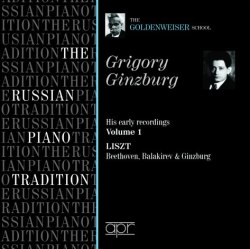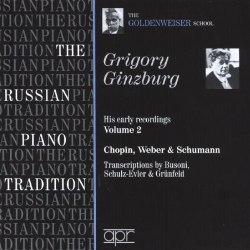| 

|
Grigory Ginzburg - His Early Recordings
Volume 1
Ludwig van BEETHOVEN (1770-1827)
Turkish March ('The Ruins of Athens') arr. Anton Rubinstein [2:04]
rec. Moscow c.1930
Franz LISZT (1811-1886)
Hungarian Rhapsody No 10 in E major S244 [4:37]
rec. Moscow c.1940
Hungarian Rhapsody No 11 in A minor S244 [5:23]
rec. Moscow c.1942
'Les cloches de Genève' (Année de Pèlerinage I) S160 [6:06]
rec. Moscow c.1942
Paganini Etudes S140, No 3 in A minor 'La Campanella' [4:23]; No 4 in E major 'Arpeggio' [2:09]; No 5 in E major 'La chasse' [2:45]
rec. Moscow 1951
'Gondoliera' and 'Tarantella' from 'Venezia e Napoli' (Supplement to Année de Pèlerinage II) S162 [13:57]
rec. Moscow 1948
Paraphrase on Verdi’s Rigoletto, S 434 [6:27]
rec. Moscow 1951
Fantasia on two themes from 'Le Nozze di Figaro' by Mozart S697 arr. Ferruccio Busoni [15:40]
rec. Moscow 1948
Grigory GINZBURG (1904-1961)
Transcription of 'Largo al factotum' from 'Il Barbiere di Siviglia' [4:14]
rec. Moscow 1951
Mily BALAKIREV (1837-1910)
Islamey - oriental fantasy [8:25]
rec. Moscow c.1942
Grigory Ginzburg (piano)
rec. 1930-51, Moscow
APR 5667 [77:20]
Volume 2
Johann Sebastian BACH (1685-1750)
Toccata and Fugue in D minor BWV565 arr. Ferrucio Busoni [9:45]
rec. Moscow c1953
Carl Maria WEBER (1786-1826)
Rondo brillante in E flat major J252 ‘La gaité’ [5:17]
rec. Moscow in 1951
Robert SCHUMANN (1810-1856)
Paganini Études Op 3: No 2 in E major [2:48]; No 4 in B flat major 2:19]
rec. Moscow c1948
Theme and variations on the name ‘Abegg’ Op 1 [8:11]
rec.Moscow in 1952
Fryderyk CHOPIN (1810-1849)
Impromptu No 1 in A flat major Op 29 [4:23]; Impromptu No 2 in F sharp major Op 36 [5:18]; Impromptu No 3 in G flat major Op 51 [6:09]; Fantasy Impromptu in C sharp minor Op 66 [5:06]
rec. Moscow c1948/9
Polonaise in B flat major Op 71 No 2 [7:02]
rec. Moscow c1950
Polonaise in A flat major Op 53 ‘Heroic’ [6:41], recorded in Moscow in 1950
Johann STRAUSS II (1825-1899) -Andrey SCHULZ-EVLER (1854-1905)
Concert Arabesques on ‘The Blue Danube’, [8:31]
recorded in Moscow c1950
Johann STRAUSS II (1825-1899) - Alfred GRÜNFELD (1852-1924)
Frühlingsstimmen Op. 410 [5:29]
rec. Moscow c1948
Grigory Ginzburg (piano)
rec. c.1948-53, Moscow
APR 5672 [78:34]
These two discs, available separately, form part of APR’s ‘The Goldenweiser School’ edition. In a chronological irony, teacher and pupil, nearly thirty years younger, died within hours of each other in 1961. Ginzburg, a meteoric and brilliant talent, was dead at 57.
He was born in 1904 and Goldenweiser became a surrogate father. By 1927 he was a competition entrant - the same year he, Lev Oborin and Dmitri Shostakovich trooped off to the Warsaw Chopin International Competition. Oborin won. He became a full professor at the Moscow Conservatoire in 1935 and regularly performed, programming Miaskovsky, Prokofiev and Shostakovich in his recitals but he did also play a lot of Grieg, Debussy and even Gershwin.
APR has collated his 78s made on either shellac or short-lived extended play vinyl. They take one from his first side, made around 1930 to 1953. It’s volume one that traces back to that first Beethoven-Rubinstein Turkish March. It was originally released coupled with an Oborin performance on the other side - a dual tribute to two of the most prominent young pianists in the Soviet Union, but not yet ones who could carry a disc on their own, it would seem. There are two Liszt Hungarian Rhapsodies in this disc, Numbers 10 and 11. The performances are beautifully clear and refined, sparing of pedal, marked by digital precision and a kind of patrician objectivity. That last quality is not without passion, but it abjures empty grandiloquence.
We can hear La Campanella in a live 1949 concert performance made a couple of years before this 1951 studio performance (VACD00101), but the studio inscription is a little marvel of limpid accuracy and pearly treble and wit. Again, half pedal at most. The Paganini etudes reveal a musician who marries precision with zest without taking any shortcuts pianistically; there is an honesty about his exalted playing, along with the dictates of clarity of articulation and voice leading. Neither Venezia e Napoli nor the Rigoletto paraphrase is a vehicle for virtuosity; they are taken seriously and rendered the more attractive through their evocative buoyancy. One of his most famous readings is the Liszt-Busoni Fantasia on two themes from 'Le Nozze di Figaro' which is another marvel of grace and precision. His own Transcription of 'Largo al factotum' from 'Il Barbiere di Siviglia' is deliciously done, and if Islamey isn’t in the Barere class, it is formidable in its own right.
Volume two concentres on Chopin and Schumann, with a valuable series of transcriptions, too. The first piece is the magisterial c.1953 recording of the Bach-Busoni Toccata and Fugue, a performance of variegation, control and commanding authority. Its peaks and troughs are demarcated with tremendous control. Weber’s Rondo brillante is quite a rare example of Ginzburg’s way with this composer and whilst his Schumann Paganini Etudes are better-known quantities they too reveal the unforced excellence of his perceptive musicianship, which was far more convincing in a wider range of styles than is usually thought. The Chopin sequence - three Impromptus, the Fantasy Impromptu, and two Polonaises - comes from c.1948-50. The skittish nature of the A flat major Impromptu is soon diverted into something more weighty, and whilst the Op.53 Polonaise is treated here as a good vehicle for extrovert dynamism, it is not without a commanding profile. The range he cultivates throughout his performances, from the merest whisper to the most Klaviertiger roar is remarkable, and he never bathes his playing in a lush wash of pedal - he is the music’s clarifying servant at all times. And so he proves in the Viennese sweetmeats that end the programme, hyphenated Strauss the Younger, first the notorious Schulz-Evler Concert Arabesques on ‘The Blue Danube’ and then pianist Alfred Grünfeld’s Frühlingsstimmen transcription. Both these may appear too frothy for a supposedly serious-minded virtuoso such as Ginzburg, but of course, not a bit of it. He himself was a transcriber and he used the precedent of Schulz-Evler, in particular, so these two recordings attest to his command of the idiom, and not just his brilliant zest and colouristic élan.
Ginzburg has been well served over the years. There was a major Arlecchino retrospective, amounting to some 11 CDs. He made it, naturally, into BMG’s Russian Piano School series (volume 12) and Vox Aeterna released archive recital discs from 1949 to 1957, a number of which I reviewed at the time of issue or shortly after. These two APR CDs form a harmonious look at his early studio recordings and they are complementary and indispensable items for a Ginzburg collection.
Jonathan Woolf
 |
 |
|
